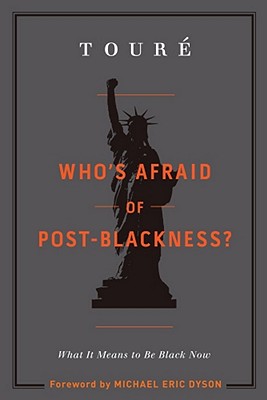Book Review: Who’s Afraid Of Post-Blackness?: What It Means To Be Black Now
Book Reviewed by Kam Williams
’We’re in a post-Black era when our identity options are limitless. And there’s no going back… Post-Black means we are like Obama: rooted in but not restricted by Blackness… Our community is too diverse, complex, imaginative, dynamic, fluid, creative, and beautiful to impose restraints on Blackness…
In this book, I seek to legitimize and validate… that the definitions and boundaries of Blackness are expanding… into infinity.”
—Excerpted from Chapter 1 (pg 12)
The election of Barack Obama as President of the United States led many a
pundit to conclude that America had entered a post-racial age. That notion
was somewhat easy to digest given that the Genome Project had simultaneously
determined, scientifically, that there’s only one race, the human race.
Now, three years later, Touré is ready to up the ante by suggesting that
we’re post-Black, too, and he’s enlisted the assistance of over a hundred
leading African-American luminaries from all walks of life to make his case.
By the way, I capitalize "Black" but not "white" for the purposes of this
review, since that’s the approach employed by the author in Who's Afraid of
Post-Blackness, a fascinating examination of the question of whether 21st
Century Blacks are simply too diverse to be pigeonholed anymore.
Touré’s intriguing thesis is based both on anecdotal and empirical evidence,
as his semi-autobiographical text is almost equally divided between his own
personal reflections and responses elicited from his subjects on a variety
of subjects. The opus was ostensibly inspired by the deep scar left by his
having been embarrassed back in college by a presumably "Blacker" classmate
who questioned his street credentials by shouting "Shut up, Touré! You ain’t
Black!" at him in a very public forum.
Unprepared for the humiliating slight, Touré sort of slinked away instead of
responding with a pithy retort. However, that ain’t the case today, as he
has matured over the intervening years into a rather witty and loquacious
journalist prepared to engage on virtually any topic of conversation, as
reflected by his omnipresence on the TV airwaves where he is regularly
consulted as an expert on popular culture. Arriving at post-Blackness must
have been no mean feat for this brother from Beantown who admits that "it
was impossible for me as a small child in Boston to not notice the racism
around me" in a hostile city that "my parents felt was dangerously racist."
Among the probing questions Touré posed to each of his contributors were
such thought-provoking conversation-starters as: "What does being Black mean
to you?" "What is the most racist thing to ever happen to you?" "Would you
be comfortable eating watermelon in a room full of white people?" "What do
you think of the N-word?" "Do you love America?" "Are there advantages to
being light [skinned]?" and "Do you think Blacks have ways of imposing
limits on Black identity?"
The participants in Touré’s impromptu survey ranged from Reverends Al
Sharpton and Jesse Jackson to Professors
Henry Louis "Skip" Gates,
Cornel
West, Marc Lamont Hill and Alvin Poussaint to television news correspondents
Soledad O’Brien,
Juan Williams and
Roland Martin to talking heads Harold
Ford, Jr. and Shelby Steele to artists and entertainers like Questlove,
Chuck D, Talib Kweli, Paul Mooney and Kara Walker.
The diversity of insights and opinions shared in this enlightening treatise
leaves no doubt that, while a monolithic Black mindset might have served a
very valuable purpose from the slave days right up through the triumphs of
the Civil Rights Movement, there are now as many different ways to be Black
as there are African-Americans.
And if that’s the definition of post-Black, there’s obviously nothing to
fear about it. Maybe it's high-time we continue to challenge white
stereotypes of African-Americans while also working to eliminate the
self-limiting constraints we tend to place on ourselves.

